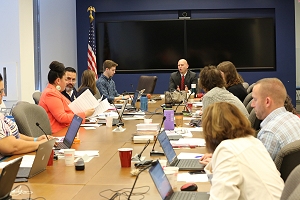On October 18-20, the Indian Health Service (IHS) Division of Epidemiology and Disease Prevention hosted the Directors of the Tribal Epidemiology Centers (TECs) in their first meeting at Indian Health Service’s (IHS) headquarters in Rockville, Maryland.
The TECs met with leaders from the IHS Office of Public Health Support, the IHS Division of Behavioral Health, the Department of Justice, the Centers for Disease Control and Prevention’s National Center for Chronic Disease Prevention and Health Promotion, the National Institutes of Health (NIH) National Institute on Minority Health and Health Disparities, the NIH National Cancer Institute, the NIH National Institute on Drug Abuse and the NIH National Institute on General Medical Sciences.

The TEC Directors discussed their shared mission, brainstormed on future collaborations, described funding gaps and community strengths, and made plans to expand their outreach to other federal agencies and organizations. Emerging issues included: the expansion of their technical assistance to the IHS Methamphetamine and Suicide Prevention Initiative and Domestic Violence Prevention Initiative grantees, possible TEC-supported responses to the threat of the Zika virus to American Indian and Alaska Native (AI/AN) communities, and the sustainability of funding for the core Public Health functions of the TEC program.
The TECs recently celebrated their 20th year working to improve public health capacity and the availability of valid and reliable data in AI/AN populations. Currently, the TECs serve all 12 IHS Areas and the Urban Indian population and are recognized as Public Health authorities through the Indian Health Care Improvement Act.
The TECs are currently supported by IHS through a cooperative agreement to carry out seven core functions as articulated through consultation with Tribal leaders. These functions include:
- data collection;
- evaluation of systems that impact AI/AN health;
- assisting tribes with identifying health objectives priorities and services;
- making recommendations for targeted services;
- making recommendations for improving health care delivery systems;
- providing technical assistance to Indian tribes, tribal organizations, and urban Indian organizations; and
- providing disease surveillance and assisting Indian tribes, tribal organizations, and urban Indian communities to promote public health.
To learn more about these programs, please visit: http://tribalepicenters.org/ or https://www.ihs.gov/Epi/index.cfm?module=epi_tec_tecs



